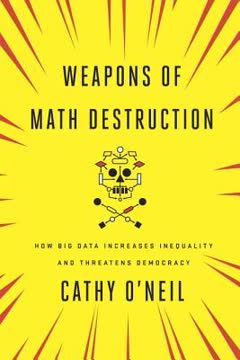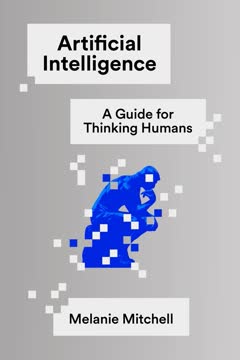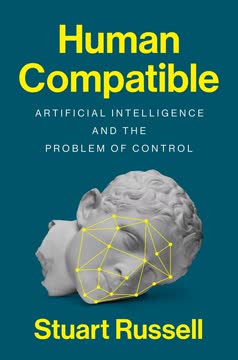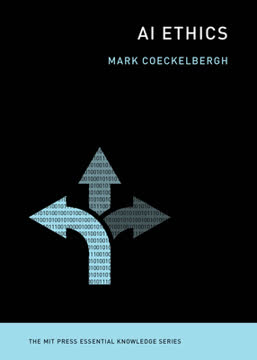Key Takeaways
1. AI's pervasive impact necessitates ethical consideration
AI is already happening today and it is pervasive, often invisibly embedded in our day-to-day tools and as part of complex technological systems.
AI's ubiquity: Artificial intelligence has seamlessly integrated into our daily lives, powering everything from social media algorithms to healthcare diagnostics. This pervasiveness raises urgent ethical questions about its impact on society, privacy, and human autonomy.
Ethical challenges: As AI becomes more sophisticated, we face complex ethical dilemmas:
- Should self-driving cars prioritize passenger safety over pedestrians?
- How do we ensure AI doesn't perpetuate or amplify existing biases?
- What are the implications of AI-powered surveillance on personal privacy?
These questions demand thoughtful consideration and proactive policy-making to ensure AI benefits humanity while minimizing potential harms.
2. Philosophical debates on AI challenge human exceptionalism
Darwin and Freud dethroned our beliefs of exceptionalism, our feelings of superiority, and our fantasies of control; today, artificial intelligence seems to deal yet another blow to humanity's self-image.
Redefining humanity: The development of AI forces us to confront fundamental questions about human nature, consciousness, and our place in the world. Philosophers and scientists debate whether machines can truly think, feel, or possess consciousness.
Key philosophical questions:
- Can machines possess genuine intelligence or merely simulate it?
- What constitutes consciousness, and can it be replicated artificially?
- If machines surpass human cognitive abilities, what implications does this have for human value and purpose?
These debates challenge long-held notions of human exceptionalism and prompt us to reconsider what it means to be human in an age of increasingly intelligent machines.
3. Current AI capabilities and applications shape our daily lives
Machine learning can be used to recognize faces (and even recognize emotions based on analysis of the faces), make search suggestions, drive a car, make personality predictions, predict who is going to re-offend, or recommend music to listen to.
Real-world applications: AI has moved beyond science fiction and theoretical discussions to become an integral part of various industries and everyday activities.
Examples of AI in action:
- Healthcare: AI assists in diagnosing diseases and developing treatment plans
- Finance: Algorithms detect fraudulent transactions and make investment decisions
- Transportation: Self-driving cars and predictive maintenance systems
- Entertainment: Personalized content recommendations on streaming platforms
- Customer service: Chatbots and virtual assistants handle inquiries
These applications demonstrate AI's potential to enhance efficiency and decision-making across diverse fields, while also raising concerns about job displacement and over-reliance on automated systems.
4. Machine learning and data science drive AI advancements
Scientists used to create theories to explain data and make predictions; in machine learning, the computer creates its own models that fit the data.
Paradigm shift: Machine learning represents a fundamental change in how we approach problem-solving and data analysis. Instead of relying solely on human-created theories and models, AI systems can autonomously identify patterns and generate insights from vast amounts of data.
Key concepts in machine learning:
- Supervised learning: AI learns from labeled data to make predictions
- Unsupervised learning: AI identifies patterns in unlabeled data
- Reinforcement learning: AI learns through trial and error, receiving feedback on its actions
- Deep learning: Neural networks with multiple layers process complex patterns
This data-driven approach has led to breakthroughs in areas like natural language processing, computer vision, and predictive analytics, enabling AI to tackle increasingly complex tasks and make more accurate predictions.
5. AI raises critical concerns about privacy, bias, and responsibility
The danger is, once again, the exercise of power without knowledge and (therefore) without responsibility—and, worse, others being subjected to this.
Ethical pitfalls: As AI systems become more powerful and influential, they introduce new risks and ethical challenges that must be addressed.
Key ethical concerns:
- Privacy: AI's data-hungry nature raises questions about data collection and use
- Bias: AI systems can perpetuate and amplify existing societal biases
- Responsibility: Determining accountability for AI-driven decisions is complex
- Transparency: Many AI systems operate as "black boxes," making it difficult to understand their decision-making processes
- Job displacement: AI automation may lead to significant workforce disruptions
Addressing these concerns requires a multidisciplinary approach involving technologists, ethicists, policymakers, and affected communities to develop responsible AI practices and safeguards.
6. Policymakers grapple with regulating AI development and use
Even if transparency were desirable and possible, it may be difficult to realize it in practice. For example, private companies may not be willing to reveal their algorithms because they want to protect their commercial interests.
Regulatory challenges: Policymakers face the daunting task of creating frameworks that promote innovation while protecting public interests and individual rights.
Key policy considerations:
- Balancing innovation with regulation
- Ensuring AI transparency and explainability
- Protecting privacy and data rights
- Addressing potential job displacement
- Promoting ethical AI development and use
- International cooperation on AI governance
Effective AI regulation requires a nuanced understanding of the technology, its potential impacts, and the diverse stakeholders involved. Policymakers must navigate competing interests and rapidly evolving technological landscapes to create adaptive and forward-looking regulatory frameworks.
7. Balancing AI progress with environmental and societal priorities
AI can also cause problems and potentially make things worse for the environment—and hence for all of us. Consider again increased energy consumption and waste.
Holistic perspective: While AI offers potential solutions to global challenges, it's crucial to consider its broader impacts on society and the environment.
Key considerations:
- Environmental impact: AI's energy consumption and e-waste generation
- Climate change: AI's role in both exacerbating and mitigating climate issues
- Social equity: Ensuring AI benefits are distributed fairly across society
- Human-centric development: Prioritizing human well-being in AI advancement
- Long-term sustainability: Aligning AI progress with sustainable development goals
As we develop and deploy AI technologies, we must prioritize sustainable and inclusive approaches that consider not only technological advancement but also environmental stewardship and social responsibility. This requires ongoing dialogue between technologists, policymakers, environmentalists, and diverse stakeholders to shape an AI future that enhances human flourishing while preserving our planet.
Last updated:
FAQ
What's "AI Ethics" by Mark Coeckelbergh about?
- Overview of AI Ethics: The book explores the ethical implications of artificial intelligence (AI) and its impact on society, focusing on both current and future challenges.
- Philosophical and Practical Issues: It addresses philosophical questions about the nature of AI and its moral status, as well as practical issues like bias, privacy, and responsibility.
- Policy and Regulation: Coeckelbergh discusses the need for policy and regulation to ensure AI technologies are developed and used ethically.
- Cultural and Historical Context: The book places AI ethics within a broader cultural and historical context, examining narratives and fears surrounding AI.
Why should I read "AI Ethics" by Mark Coeckelbergh?
- Comprehensive Insight: The book provides a thorough understanding of the ethical challenges posed by AI, making it essential for anyone interested in technology and ethics.
- Interdisciplinary Approach: It combines insights from philosophy, technology, and policy, offering a well-rounded perspective on AI ethics.
- Current and Future Relevance: As AI becomes more integrated into daily life, understanding its ethical implications is crucial for informed decision-making.
- Engaging Narratives: Coeckelbergh uses historical and cultural narratives to make complex ethical issues more relatable and understandable.
What are the key takeaways of "AI Ethics" by Mark Coeckelbergh?
- Ethical Challenges: AI presents numerous ethical challenges, including bias, privacy concerns, and the need for transparency and accountability.
- Human-Centric Approach: The book advocates for a human-centric approach to AI, ensuring technology serves human interests and values.
- Policy and Regulation: Effective policy and regulation are necessary to address the ethical issues associated with AI and to guide its development responsibly.
- Philosophical Inquiry: Understanding AI ethics requires philosophical inquiry into the nature of intelligence, agency, and moral responsibility.
What are the best quotes from "AI Ethics" by Mark Coeckelbergh and what do they mean?
- "AI is already happening today and it is pervasive, often invisibly embedded in our day-to-day tools." This highlights the ubiquity of AI in modern life and the importance of understanding its ethical implications.
- "AI ethics is about technological change and its impact on individual lives, but also about transformations in society and in the economy." This quote emphasizes the broad impact of AI, affecting not just individuals but entire societal structures.
- "The challenge for us today, then, is to make sure that we build AI that somehow does not raise this control problem—that it does what we want and takes into consideration our rights." This underscores the importance of designing AI systems that respect human autonomy and rights.
How does Mark Coeckelbergh define AI in "AI Ethics"?
- Intelligence Displayed by Machines: AI is defined as intelligence displayed or simulated by code or machines, often compared to human intelligence.
- Beyond Human-Like Intelligence: Coeckelbergh notes that intelligence need not be human-like, and AI can encompass a range of cognitive functions.
- Historical Context: The book traces the history of AI from early philosophical ideas to modern technological developments.
- Practical Applications: AI is seen as both a scientific discipline and a practical technology with applications across various domains.
What ethical issues does "AI Ethics" by Mark Coeckelbergh address?
- Bias and Discrimination: The book discusses how AI can perpetuate societal biases and the ethical implications of such discrimination.
- Privacy Concerns: AI's ability to collect and analyze vast amounts of data raises significant privacy issues.
- Responsibility and Accountability: Coeckelbergh explores who should be held accountable for the actions and decisions made by AI systems.
- Transparency and Explainability: The need for AI systems to be transparent and explainable to ensure trust and accountability is emphasized.
How does "AI Ethics" by Mark Coeckelbergh approach the concept of moral agency in AI?
- Moral Agency Defined: Moral agency involves the capacity for moral reasoning and decision-making, traditionally attributed to humans.
- AI's Moral Capacity: The book questions whether AI can possess moral agency, given its lack of consciousness and emotions.
- Functional Morality: Coeckelbergh discusses the idea of functional morality, where AI systems are designed to evaluate ethical consequences without full moral agency.
- Human Responsibility: Ultimately, the book argues that humans must retain responsibility for AI's actions, as machines lack the necessary moral capacities.
What role does policy play in "AI Ethics" by Mark Coeckelbergh?
- Regulatory Frameworks: The book emphasizes the importance of developing regulatory frameworks to address AI's ethical challenges.
- Proactive Measures: Coeckelbergh advocates for proactive ethics, integrating ethical considerations into AI design and development.
- Stakeholder Involvement: Effective policy requires input from various stakeholders, including governments, tech companies, and the public.
- Balancing Innovation and Ethics: The book discusses the need to balance technological innovation with ethical considerations to ensure AI benefits society.
How does "AI Ethics" by Mark Coeckelbergh address the future of work?
- Job Displacement Concerns: The book explores the potential for AI to displace jobs and the ethical implications of such changes.
- Economic Transformation: Coeckelbergh discusses how AI could transform economies and the nature of work itself.
- Meaningful Work: The book questions what constitutes meaningful work and how AI might impact human fulfillment and purpose.
- Policy Responses: Coeckelbergh suggests policy measures to address job displacement and ensure equitable distribution of AI's benefits.
What is the significance of cultural and historical narratives in "AI Ethics" by Mark Coeckelbergh?
- Contextual Understanding: Cultural and historical narratives provide context for understanding contemporary fears and hopes about AI.
- Frankenstein and Golem Myths: The book examines myths like Frankenstein and the Golem to illustrate longstanding concerns about creating artificial beings.
- Narrative Influence: Coeckelbergh argues that these narratives shape public perception and policy regarding AI.
- Constructing New Narratives: The book suggests constructing new narratives to better understand and guide AI's development.
How does "AI Ethics" by Mark Coeckelbergh address the concept of superintelligence?
- Definition and Concerns: Superintelligence refers to AI surpassing human intelligence, raising concerns about control and existential risks.
- Speculative Nature: Coeckelbergh notes that while superintelligence is a popular topic, it remains speculative and distant.
- Focus on Current Issues: The book emphasizes addressing current ethical challenges rather than distant superintelligence scenarios.
- Philosophical Implications: Superintelligence discussions raise philosophical questions about human nature and the future of humanity.
What are the implications of AI on privacy according to "AI Ethics" by Mark Coeckelbergh?
- Data Collection: AI's ability to collect and analyze personal data poses significant privacy risks.
- Surveillance Concerns: The book discusses how AI can be used for surveillance, impacting individual privacy and freedom.
- Informed Consent: Coeckelbergh emphasizes the importance of informed consent and transparency in data collection and use.
- Policy and Regulation: The book advocates for robust policy and regulation to protect privacy in the age of AI.
Review Summary
AI Ethics receives mixed reviews, with praise for its accessible overview of AI ethics issues but criticism for lack of depth. Readers appreciate the book's introduction to key concepts and philosophical perspectives, but some find it repetitive and lacking concrete solutions. The book is seen as a good starting point for newcomers to AI ethics, raising important questions about bias, privacy, and societal impact. However, more experienced readers may find it too basic. Some note the rapidly evolving nature of AI makes the 2020 publication feel outdated.
Similar Books







Download PDF
Download EPUB
.epub digital book format is ideal for reading ebooks on phones, tablets, and e-readers.




